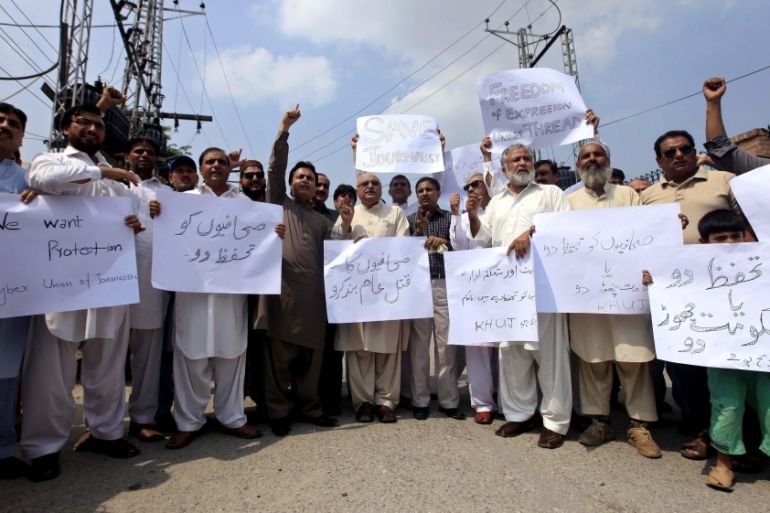Understanding the context of Quetta attack in Pakistan
The terrorist threat in the country has been greatly reduced, but it is not going away any time soon.

The terrorist attack that killed dozens of lawyers in the western Pakistani city of Quetta is a reminder that terrorists could be forced to evacuate one area but, given time, they will re-emerge from another to carry out a fresh campaign that could threaten the government where it is most vulnerable.
Since being driven out of the Federally Administered Tribal Areas last year by 170,000 soldiers, the Pakistan Taliban has proven resilient and resourceful.
Keep reading
list of 4 itemsAttack on Quetta police academy blamed on banned group
Fighters kill 60 in police academy in Pakistan
Pakistan mourns deadly hospital attack in Quetta
Since then, its leaders and several thousand fighters relocated into eastern provinces of Afghanistan where neither the government nor the Afghan Taliban dominate.
It formed a tactical alliance with splinter factions, including the regional chapter of the Islamic State of Iraq and the Levant (ISIL, also known as ISIS). Together, they have established bases of operation along the eastern and southern Afghan border with Pakistan.
Security challenges and economic opportunities
With increasing frequency this year, the Pakistan Taliban has carried out terrorist attacks in Quetta and other areas of the vast, thinly populated province of Balochistan, presenting a renewed security challenge for the government.
The province has been plagued by a low-intensity separatist insurgency by renegade Baloch tribal chiefs and nationalists for more than a decade.
Despite deep-seated public anger towards the federal government, the insurgency is gradually winding down.
The government hopes that Baloch bitterness will be addressed to some extent by a massive Chinese investment programme in Pakistani infrastructure centred around the Arabian Sea port of Gwadar.
A significant portion of the $46bn in planned investments over the next 10 years will take place along Balochistan’s lengthy border with Iran, from where China hopes to import oil and natural gas by pipeline.
The China-Pakistan Economic Corridor is a one-time opportunity for Pakistan to resolve its crippling power supply shortfalls, and for the first time to establish a nationwide network of logistical infrastructure.
In Pakistan, the authorities have adamantly denied that ISIL has made inroads, despite evidence that affiliated militant factions and online recruits have been involved in several major attacks.
Assuming that the investments go ahead as planned, and taking into account the long-standing benchmark that every dollar spent on such infrastructure generates three times more peripheral activity, overall investment in Pakistan is set to practically double.
On the other hand, if security conditions and other factors were to stymie the programme, Pakistan’s economy would continue to lag behind the rest of Asia for the foreseeable future.
So much at stake for all
With so much at stake, the Pakistan Taliban and its ISIL allies have every reason to target Balochistan.
Every significant attack it stages in the region is a blow to Pakistan’s development and a disincentive for China, despite its deep-set desire to extend its infrastructure directly to the Indian Ocean.
China is already deeply concerned about the threat posed to it by ISIL, which has attracted ethnic Uighurs from the restive western province of Xinjiang, which borders Pakistan’s mountainous north.
Last week, it formed a regional counterterrorism alliance with Afghanistan, Pakistan and Tajikistan to address those concerns.
OPINION: The China-Pakistan corridor – a fate-changer?
Iran is the terrorists’ other major target. For many years, Balochistan-based terrorist groups linked to al-Qaeda have targeted the Shia Muslim community, including busloads of pilgrims travelling overland through Balochistan to visit shrines in Iran.
Similarly, they have launched occasional attacks on Iranian border guards, prompting retaliatory fire.
In recent times, those groups have switched loyalty to ISIL, helping it to establish a network of small cells in Balochistan, where it plans to headquarter its regional chapter.
Clearly, ISIL has every intention of using it as a launchpad for more complex attacks on Iran. That has prompted Iran to seek the cooperation of the Pakistani authorities in preventing the spread of ISIL along its border.
Blame-shifting
In Pakistan, however, the authorities have adamantly denied that ISIL has made inroads, despite evidence that affiliated militant factions and online recruits have been involved in several major attacks, including a 2014 attempt to hijack a navy frigate and use it to attack US vessels.
Instead, government functionaries have claimed that Pakistan’s eternal adversary, India, is conniving with the Afghan intelligence service and Pakistani terrorists to undermine Pakistan’s security.
OPINION: The end of Pakistan’s double-games in Afghanistan
That narrative is as counterproductive as it is dubious. While Pakistan’s covert operatives have been at war with their Indian counterparts for the longest time and both sides have a history of using terrorist proxies, to say that Pakistani terrorists are pursuing India’s agenda is ridiculous.
No matter how much they hate the Pakistani government, all terrorist commanders started their career fighting Indian security forces in Kashmir and still view India as their ultimate enemy.

Such claims reek of blame-shifting and cause confusion that creates space for the terrorists to exploit.
When they are invariably exposed as false by a massive attack such as the one on Quetta, the public reacts with anger and fear. Their faith in the state is undermined and morale slumps, dragging the economy with it.
On the other hand, a discreetly worded acknowledgement of the situation would help galvanise public support for the government’s counterterrorism efforts.
It is time for Pakistan’s government – in particular, its powerful military – to tell them the truth: The terrorist threat has been greatly reduced, but it is not going away any time soon.
Tom Hussain is a journalist and Pakistan affairs analyst based in Islamabad.
The views expressed in this article are the author’s own and do not necessarily reflect Al Jazeera’s editorial policy.
